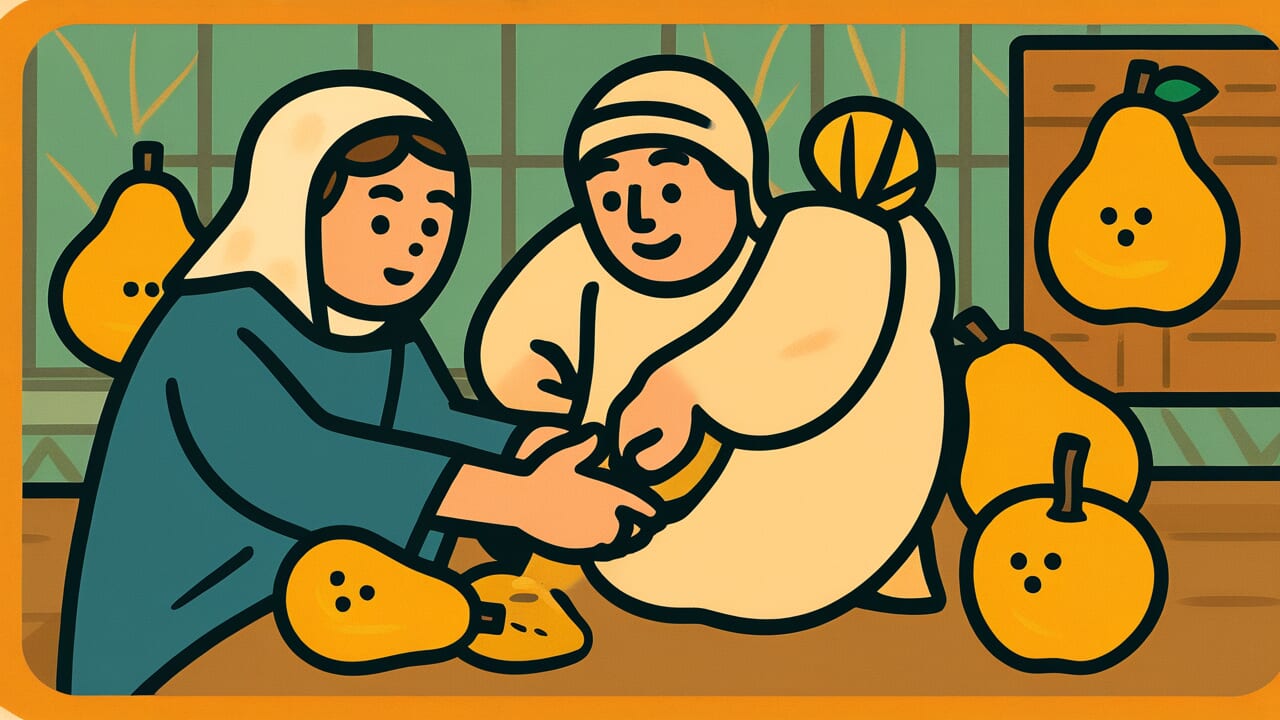How to Read “Let a beggar peel a pear, let a lord peel a melon”
なしのかわはこじきにむかせ、うりのかわはだいみょうにむかせ
Meaning of “Let a beggar peel a pear, let a lord peel a melon”
This proverb means that tasks should be assigned to the right people. Each job needs someone suited for it.
Tasks requiring caution, like peeling a pear’s thin skin, need different people than tasks requiring boldness, like peeling a melon’s thick skin.
People use this saying when dividing work or assigning roles. Give detailed work to those skilled at precision.
Give decisions requiring boldness to those who can act decisively. This is the teaching behind the proverb.
In modern times, this thinking matters in team management and personnel placement. Everyone has strengths and weaknesses.
Understanding these traits and assigning appropriate roles maximizes overall results. Rather than forcing people into tasks they struggle with, leverage their strengths.
This proverb teaches us the importance of thoughtful placement.
Origin and Etymology
The exact literary origin of this proverb is unclear. However, it likely emerged from common wisdom during the Edo period.
It uses familiar fruits, pears and melons, to explain the concept of matching people to tasks.
Why should a beggar peel a pear and a lord peel a melon? Pear skin is thin.
If you peel too close, you cut into the flesh. People called beggars avoided wasting food.
They tended to peel thickly, preserving more flesh. Melon skin, however, is thick.
You can peel boldly without problems. In fact, peeling generously like a lord accustomed to luxury makes it taste better.
This contrast reflects lifestyle differences in Edo period social classes. Poor people acted cautiously, wealthy people acted boldly.
These behavior patterns are overlaid onto the everyday task of peeling fruit. However, the proverb’s essence isn’t about social hierarchy.
It’s about leveraging each person’s characteristics. It teaches the importance of understanding task nature and human traits.
This represents ancestral wisdom conveyed with humor.
Interesting Facts
Pears have been cultivated in Japan since ancient times. Seeds have been found in Yayoi period archaeological sites.
During the Edo period, breeding improved varieties. Pears became accessible fruit for common people.
Melons, meanwhile, were cherished as summer delicacies. The makuwa melon was especially sweet and treated as a luxury item.
The contrast between “beggar” and “lord” in this proverb reflects Edo period social hierarchy. Today, these terms may be avoided as discriminatory occupational language.
However, the proverb’s essence isn’t social discrimination. It explains the importance of matching task characteristics with human characteristics.
Usage Examples
- This project needs careful adjustments, so following “Let a beggar peel a pear, let a lord peel a melon,” let’s assign it to cautious Tanaka-san
- When bold decisions are needed, we should follow the spirit of “Let a beggar peel a pear, let a lord peel a melon” and assign it to someone decisive
Universal Wisdom
This proverb teaches us to recognize human diversity and leverage it. The world contains people with various personalities and abilities.
Each person has roles they’re suited for. Cautious people excel in situations requiring careful attention.
Bold people shine when decisive judgment is needed.
We tend to judge others by our own standards. We criticize cautious people as “indecisive.”
We condemn bold people as “reckless.” But perhaps the situation simply doesn’t match their strengths.
Sometimes caution is needed, like peeling a pear. Sometimes boldness is required, like peeling a melon.
This proverb has endured because human society has always depended on cooperation. No one can do everything alone.
That’s why recognizing each other’s strengths and dividing roles appropriately becomes key to collective success.
This is the essence of organizational management. It’s also wisdom for smooth human relationships.
Turning diversity into strength—this deep ancestral insight is embedded in this proverb.
When AI Hears This
This proverb demonstrates how society finds optimal solutions without central command. Pears have thin skin and much edible flesh, so peeling thinly is correct.
Melons taste bitter near the skin, so peeling thickly is correct. These opposite tasks naturally get accomplished by assigning them to poor and wealthy people.
No explicit instructions needed.
Why does this work? Poor people are sensitive to the loss of wasting food.
They peel carefully and thinly. Wealthy people are sensitive to the loss of wasting time.
They peel quickly and thickly, even discarding some flesh. Each has a different loss function.
The same task naturally undergoes different optimization.
Modern economics uses incentive design. It sets appropriate rewards or penalties to guide people toward desired behaviors.
What’s interesting about this proverb is that without any design, just differences in people’s situations achieve socially optimal allocation.
Loss-averse people for pears, time-efficient people for melons. Task nature and human characteristics automatically match.
This resembles self-organization in distributed systems. Each agent pursues only its own interests.
Yet the whole converges to an efficient state. Emergent optimization occurs beyond the designer’s intention.
Lessons for Today
Modern society tends to demand that everyone be versatile. But this proverb shows another path.
You have a role only you can fill.
What matters is understanding your characteristics and finding where you can leverage them. If you’re cautious by nature, you can excel at work requiring attention to detail.
If you’re bold by nature, you can shine when taking risks and pioneering new paths.
Effort to overcome weaknesses matters. But developing strengths and applying them where needed may bring more happiness to you and those around you.
Also, those in leadership or management positions must recognize member diversity. They should consider placement that leverages each person’s strengths.
Rather than measuring people with uniform evaluation standards, finding roles where each person shines most leads to team success.
Your individuality isn’t a flaw but potential. With the spirit of matching people to tasks, find where you can thrive as yourself.



Comments